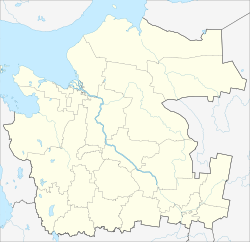Molotovsk
| Severodvinsk (English) Северодвинск (Russian) |
|
|---|---|
| - City - | |
 Lomonosova Street in Severodvinsk |
|
 Location of Arkhangelsk Oblast in Russia |
|
|
|
|
|
|
|
|
|
|
| Anthem | Anthem of Severodvinsk |
| City Day | Last Sunday of July |
| Administrative status (as of June 2013) | |
| Country | Russia |
| Federal subject | Arkhangelsk Oblast |
| Administratively subordinated to | city of oblast significance of Severodvinsk |
| Administrative center of | city of oblast significance of Severodvinsk |
| Municipal status (as of April 2014) | |
| Urban okrug | Severodvinsk Urban Okrug |
| Administrative center of | Severodvinsk Urban Okrug |
| Mayor | Mikhail Gmyrin |
| Representative body | City Council of Deputies |
| Statistics | |
| Population (2010 Census) | 192,353 inhabitants |
| - Rank in 2010 | 95th |
| Time zone | MSK (UTC+03:00) |
| Founded | 1936 |
| Previous names |
Sudostroy (until 1938), Molotovsk (until 1957) |
| Postal code(s) | 164500–164502, 164504, 164505, 164507, 164509, 164510, 164512, 164514, 164515, 164518, 164520–164524, 164529 |
| Dialing code(s) | +7 81842 |
|
|
|
| on | |
Severodvinsk (Russian: Северодвинск; IPA: [sʲɪvʲɪrɐdˈvʲinsk]) is a city in the north of Arkhangelsk Oblast, Russia, located in the delta of the Northern Dvina River, 35 kilometers (22 mi) west of Arkhangelsk, the administrative center of the oblast. As of the 2010 Census, the population was 192,353. Due to the presence of important military shipyards (specialised in submarines since the Soviet period), Severodvinsk is an access restricted town for foreign citizens. A special pass is required.
Vikings explored the territories around the North Dvina River - part of Bjarmaland - at the start of the first millennium. British and Norman ships came to these places for mining, fur and fishing before the 13th century, but later the climate became colder and access to the northern seas became closed.
The historical records first mention the settlement on the site of modern Severodvinsk in 1419, when the Swedes sailed into the bay and burnt down the Nikolo-Korelsky Monastery that stood by the shore during the Swedish–Novgorodian Wars. Tradition states that Saint Euphemius, an Orthodox missionary in Karelia, founded this monastery. The abbey stood in ruins until 1471, when two sons of Marfa Boretskaya died in a vicious storm; their bodies were recovered on the beach near the monastery twelve days later. At the urging of Boretskaya, the monastery was restored and her sons were buried there.
...
Wikipedia


